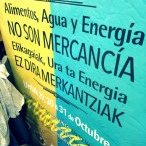English · Español

31 de octubre de 2013 | Noticias | Agua | Financiarización de la naturaleza | Séminaire International “Aliments, Eau et Energie ne sont pas des marchandises”. | Justicia climática y energía
Water under threat
International Seminar Denounces Threats to Water and its Communities Around the World
Water privatization and commodification processes were the central issues addressed by the international seminar “Food, Water and Energy are Not Commodities”, held from October 30th to 31st in the Basque Country’s capital, Bilbao. The seminar was organized by the local organization Mundubat and the Movement of People Affected by Dams of Brasil (MAB).
The organizations denounced different forms of water privatization, its threats and its impacts on human rights around the world.
Some of the speakers included Caterina Amiucci of Recommon and Fórum Agua, and Daniela Del Bene of Movimiento por el Agua, from Italy; Omar Tabakhna of the Union of Agriculture Workers, who talked about land grabbing and water appropriation in Palestine as a result of the Israeli occupation. Rosalinda Hidalgo talked about the current situation in Mexico at the 10th anniversary of the Mexican Movement Against Dams and For Rivers and Life (MAPDER), while Adrián Solana and Víctor Iguacel shared their historic local struggle against dams in Aragon, Spain.
Caterina Amiucci began her presentation by talking about the struggle against water privatization in Italy. She described the citizen’s victory in a referendum to repeal a law approved under Silvio Berlusconi’s administration that aimed to force municipalities to privatize 40% of their drinking water utilities.
The speakers then focused on exposing the negative impact of water financialization: “we are now living in an era of financial capitalism, where exchanging money, risk and other associated products is more beneficial for capital accumulation than exchanging goods and trade services”, said Amiucci.
Some of the most significant cases of financialization according to her are hydroelectric dams: “they are being built on subsidies, with tax benefits, capital markets, regulating regimes and other type of help to turn ‘infrastructure’ in a type of good that produces extraordinary benefits”.
Without these mechanisms, which are public finance tools, building dams “would not be profitable. They are using public resources for private benefit”. One of these tools is the so called Clean Development Mechanism.
Lastly, Daniela Del Bene denounced the corporations’ attempt to depoliticize the debate around the crisis in Europe. She mentioned the case of Italian energy company Enel, responsible for human rights violations in several Latin American countries.
Imagen: Radio Mundo Real








